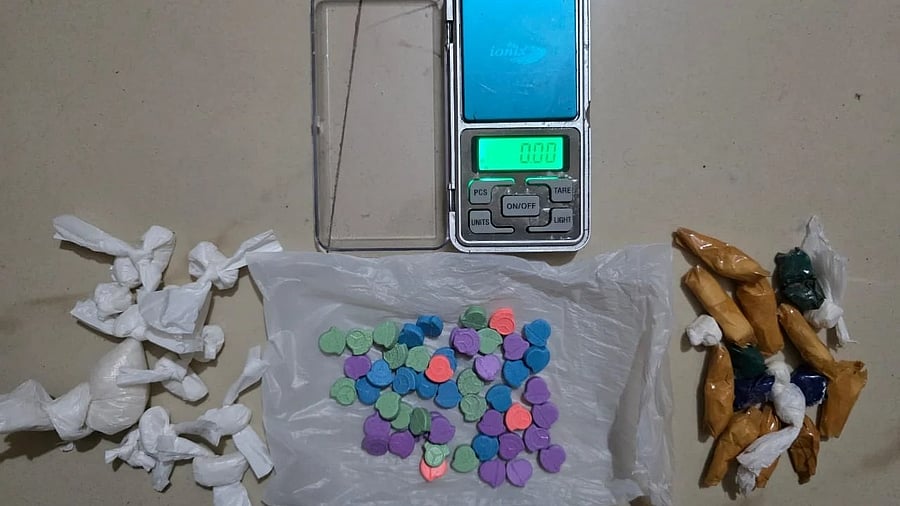
Credit: Special Arrangement
LSD, Ecstasy, Marijuana and Methamphetamine (Meth) in Bengaluru? Procuring these banned party drugs is not difficult. One should just know the right numbers to dial.
Two DH reporters managed to track down LSD and Marijuana sellers with just a call. They were offered 50 gm of high-quality Marijuana for Rs 3,500 and a four mm piece of LSD paper for Rs 1,700, but they backed out.
Marijuana, LSD, Methamphetamine (Meth), and Ecstasy are not only the most popular substances, but also readily available through tight-knit networks of users and dealers. Though many in Bengaluru still perceive drug use as a taboo, it is being openly embraced by an increasing number of youngsters.
Secretive, tiered system
A senior police officer with Central Crime Branch (CCB) told DH that the entire system was built on secrecy, tiered distribution and rapid adaptation.
These networks rely heavily on messaging apps like Telegram. Buyers are guided to ‘drop locations’ where cash and contraband are exchanged without face-to-face contact. Payments are routed through UPI or digital wallets. Yet, even when transactions are traced, investigators often find a third party unconnected to trade.
Between 2023 and September 2025, Bengaluru police filed 1,560 NDPS cases against peddlers, seizing over 8.8 tonnes of ganja, 246 kg of synthetic drugs and more than 20,000 tablets of drugs ranging from MDMA to LSD. Nearly 7,000 individuals were detained in the same period, including 194 foreign nationals, with Nigerians topping the list. In total, the value of seizures exceeded Rs 2,500 crore, cementing Bengaluru’s role as a major hub in south Indian narcotics market. The CCB officers have even raided big parties at five star hotels and bust drug rackets.
“Nigerians are sent here only for drugs trade. They discard passports and rely on cryptocurrency,” the officer said. Nigerians accounted for one in three foreign arrests in 2023 and continue to be prominent in 2025.
The scale has only meant that cartels are using novel ways in their business.
Officers have intercepted LSD-laced chocolates and ‘bhaang golis’ near colleges, Tylenol tablets sold as highs and hydroponic cannabis cultivated inside city apartments. Inspired by international cases like that of rapper ‘Diddy’, Pink Cocaine briefly appeared in Bengaluru but quickly lost popularity due to high cost and overdose risks. Packages disguised as pet food, shipped from Thailand or Europe, have been found to contain hydroponic ganja. Post offices and sniffer dogs now form a crucial line of defence against the cartels.
Dealers switch between fake numbers, encrypted apps and even hold ‘social media auctions’ for drugs. Surveillance and human informants are essential tools. “Every time we close in, they find a new way,” the officer said.
Consumption pattern
According to the officer, consumption patterns vary by age and class. Teenagers tend to experiment with vapes and nicotine products — illegal but widely sold near schools. In their 20s, these users move to marijuana, MDMA, ecstasy and LSD. Cocaine and mushrooms, priced as high as Rs 10,000 per gram, are the choice of the wealthy. “Adolescents take risks for the thrill. But once curiosity becomes dependency, they borrow, steal or even peddle themselves to sustain the habit,” he explained.
Start as teens
DH reporters also spoke to users and peddlers and found that the availability and popularity of both synthetic and natural drugs have risen sharply. A majority of users and sellers are in their 20s, followed by those in late teens.
Nearly half (47%) of the users and sellers DH surveyed agreed that drug use often begins before 18. Strikingly, 60% of users were women and 40% men — a reversal of CCB data which suggests women usually sell rather than consume. While all those surveyed acknowledged the consequences of abuse, 66.7% had firsthand experiences with health, psychological or social fallout. All of them reported issues ranged from depression, addiction, aggression and behavioral changes to overdosing and instances of deaths and suicides.
“Most of the time, you see changes in communication skills. It really affects how regular users interact,” one peddler said. “By 25 years, many suffer schizophrenic episodes”.
City police commissioner Seemant Kumar Singh told DH that their approach to tackling the problem was based on zero tolerance. “We’ve strengthened enforcement and intelligence networks — from awareness drives that help information flow back to us to active monitoring on social media and the dark web,” he said.
The police are targeting areas around colleges to identify non-students or suspicious activity.
“Naka bandis and vehicle checks continue to yield good leads. We’ve taken action against our own staff where needed,” the commissioner said.
MANAS helpline
MANAS (Madak-Padarth Nished Asoochna Kendra) helpline - 1933 - was launched on July 18, 2024, to enable anonymous reporting of drug trafficking, illicit cultivation and related offences.
Officers with the Central Crime Branch recovered 1 kg of hydroganja that was packaged as pet food.
Credit: Bengaluru City Police